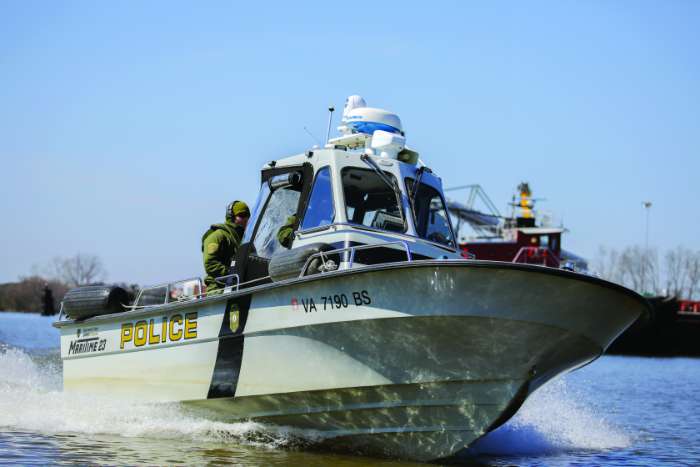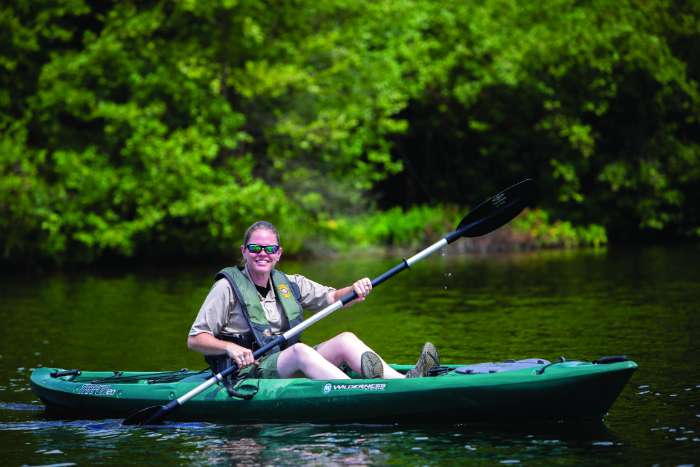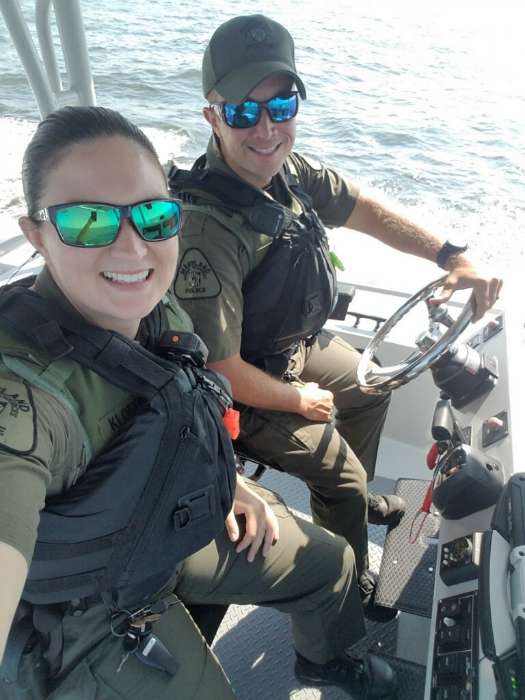Natural Resources and Conservation Officers—How They Can Help Sailors
In this three-part sailing and boating safety series, we’ll introduce some on-water first responders, including natural resource police, Coast Guard and Auxiliary responders, and firefighters. Along the way we’ll highlight relevant safety equipment, from essential to sophisticated.

Looking out for sailors, boaters, paddlers, and our natural resources
Imagine cruising out of your narrow creek on a holiday weekend with three generations aboard, when suddenly some bozo, way too close for comfort, speeds by, ignoring the no-wake buoy bouncing prominently in the center of the channel and clueless to your limited maneuverability. Your first mate steadies Grandma and the little kids as they brace themselves from the resulting waves that jolt your vessel. Or imagine at the end of an excellent, albeit long and hot, day on the water a pop-up summer thunderstorm is on the horizon. You’re nearly home when you see one or two people struggling in the water with no lifejackets. You quickly drop your sails and motor over to give assistance by tossing your throwables and hailing for help on your VHF.
In either situation, who can help? What agencies’ personnel might respond? In addition to the Coast Guard, it could be the Maryland Natural Resources Police (NRP), which is part of the Maryland Department of Natural Resources (DNR), or the Virginia Conservation Police, which is part of the Virginia Department of Wildlife Resources (DWR).
Though they have different titles, the mission of each of these agencies is essentially the same: to protect people and natural resources through education and law enforcement so that we may all safely enjoy the outdoor recreational opportunities the Chesapeake region has to offer. In addition to assisting and promoting safety and environmental education, personnel for these two important agencies enforce a wide range of laws pertaining to boating, hunting, fishing, habitat preservation and environmental protection. Importantly, they also respond to emergency calls, including those on the waterways in each jurisdiction.
We recently connected with First Sergeant Frank Spuchesi, who has served 24 years with the Virginia DWR, and Lauren Moses, a public information officer with Maryland’s DNR. Here are their responses to a few of SpinSheet’s questions about their respective agencies.
What would you like sailors and boaters to know about your agency?
FS: As the boating safety agency for the Virginia Commonwealth, our main goal is to provide a safe environment for everyone to enjoy the waterways. We’re not just out there to write tickets. We place an emphasis on the enforcement of laws that prevent reckless boating and operating under the influence of alcohol or drugs. This is done with the ultimate goal of safety in mind for boaters, sailors, paddlers, and operators of PWC. During their time at our academy, officer candidates receive boat training from the conservation police officers that are certified instructors by NASBLA (National Association of State Boating Law Administrators).

It’s not a “one and done.”
FS: Just because you’ve been sailing or boating for many years or because you’ve passed a boater safety test, does not mean there’s nothing more to be done. Seasonal inspection of safety equipment is important to determine if the equipment is still serviceable. For example, flares and fire extinguishers expire. Lifejackets succumb to dry rot, and vessel registrations expire. In addition to annual inspections, pre-departure safety checks are important too. When it comes to lifejackets, you not only need to have the required number onboard but also ones that properly fit the sizes and shapes of the passengers aboard your boat on that particular day.
What is the best part of your job?
FS: One of the best parts of this job is the diversity of the work we do. It changes as the boating, fishing, and hunting seasons change.
How do calls for maritime assistance come to your agency?
FS: Generally, calls come through the US Coast Guard as it monitors VHF channels, or the local sheriff’s department. The Coast Guard would then contact DWR dispatch, who will call local officers to respond. Sometimes, but less frequently, our dispatch is notified through a sheriff’s department.
Our boats are strategically placed to facilitate a quick response to emergencies. They may be in the water or on land at a spot where they can be quickly launched, which might be a Coast Guard station or waterfront fire or sheriff’s property. DWR Region 1, which covers the Virginia section of the Bay, is divided into six districts and each has multiple boats, from large 27-foot safe boats to 16-foot Jon boats, placed according to what is appropriate for the local waterway.
What is DWR’s role in safety education?
FS: Our officers are all NASBLA certified boating education instructors. Officers teach boater safety courses and also assist the Coast Guard Auxiliary members in administering portions of their boater safety courses, especially with respect to laws and regulations.
Maryland’s Natural Resources Police
What safety education efforts do the NRP offer?
LM: The Maryland NRP Safety Education and Outreach Unit offers boating safety courses to help educate recreational boaters about the legal requirements, navigational rules, safety equipment, risks of boating accidents, and other issues pertaining to safe boating.
The NRP Reserve Officer Unit also provides free vessel safety checks throughout the state to help ensure that boaters have the necessary equipment on their vessels in the event of an emergency. A vessel safety check is a courtesy examination of your boat to verify the presence and condition of certain safety equipment required by state and federal regulations.

What would you like sailors and boaters know about the DNR police?
LM: While NRP is a conservation law enforcement agency, officers still have statewide police authority. Therefore, conservation officers have full police powers, such as any state, city, or county police officer. Officers are not only knowledgeable about Maryland’s criminal and traffic laws, but they are also educated in conservation law as well. They are well versed officers that take pride in educating their communities. The Maryland NRP has many divisions to assist the public better, such as a K-9 team, aviation, dive team, and special operations.
Do your personnel routinely patrol the waterways, or is it more responding to calls?
LM: NRP officers are constantly on patrol to educate the public about safe boating practices and enforce the law on unsafe, negligent, and impaired boating. During their patrol, they conduct compliance checks to ensure that boaters operate soberly, have their required equipment such as lifejackets, and fully comply with Maryland law. Typically, you will see more officers on patrol during the summer months due to the increase in visitors flocking to Maryland’s beautiful waterways.
How are you notified of a boater in distress, and what happens when a call for help comes in?
LM: This can vary depending on the location of the incident. Officers are usually notified about an incident from our communications center. However, our officers are also very proactive and will respond to critical incidents if they see one. We’ve also had officers off duty who have seen someone in distress and taken immediate action to initiate a rescue.
What’s the best part of working in this agency?
LM: Being a Maryland NRP officer is like no other career because there is so much variety. Officers enforce Maryland’s hunting and boating regulations, respond to nuisance wildlife calls, perform water rescues, keep a lookout for negligent boaters, and may even go undercover to stop poachers from illegally harvesting Maryland’s precious resources. Many people do not realize how important a conservation officer’s job is. Officers primarily work outdoors regardless of weather conditions. They can find themselves on boat patrol on the Bay or foot patrol in the snowy mountains in Garrett County. The community looks to NRP officers to enforce all laws, rules, and regulations about fish and wildlife. If you have a passion for the outdoors and want to serve your community, a NRP career may be right for you. Those interested should visit: dnr.maryland.gov/nrp/pages/careers.aspx
~By Beth Crabtree
Find more articles on sailing safety here.




